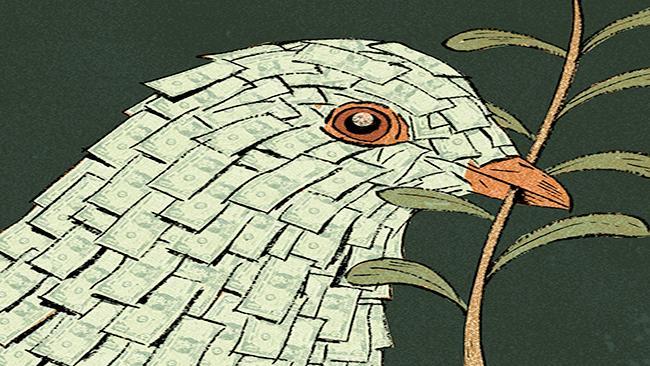
FROM 1980 on, country after country moved to greater economic and political freedom. A report released last week by Canada's Fraser Institute shows that since the global financial crisis, that wave of liberalisation has come to an end, and in some cases, reversed.
While the world economy is still far freer today, and political systems much more democratic, than three decades ago, preserving and promoting economic and political liberalism should be high on the Abbott government's agenda as it engages with our region and the wider world.
The great shift that began in the 1980s was astonishingly far-reaching. The Fraser Institute produces each year an "economic freedom index" that uses 42 pieces of data to measure economic freedom in 141 countries. From 1985 to 2007, the index shows an improvement in 112 countries and a deterioration in only 6.
The extent of the improvement was as impressive as its geographical coverage. The average index for the world rose from 5.37 out of 10 in 1985 to 6.9 in 2006, with the index for the 112 countries that liberalised rising from just over 5 at the start of the period to 7 at its end. Given that even the countries that rank most highly only achieve values around 8, the convergence to relatively liberal economies was momentous.
In large parts of the world, economic reform was accompanied by the spread of democracy. Nowhere was the transformation more dramatic than in the Soviet empire, whose collapse signalled perhaps the greatest shift from tyranny to freedom in human history. But albeit with substantial differences, democratisation and economic liberalisation also went hand in hand in Latin America and in many countries in Asia.
By 1997, Bill Clinton could say in his second inaugural address that "for the very first time in history, more people live under democracy than dictatorship".
Yet the recent picture is far from reassuring. Economic freedom has declined in 79 countries since 2007, while only increasing in 10; and Freedom House's index of political freedom also shows a worsening in twice as many countries as those in which there has been an improvement.
Inevitably, the forces at work vary enormously. What is clear, however, is that in many developing countries and in much of the former Soviet bloc, there has been a close link between partial liberalisation, corruption and the undermining of democracy.
That is not to say that state-controlled economies are free of corruption; the opposite is true. But during eras of tight authoritarian rule, graft often remains centralised and predictable, allowing people to navigate established networks of corruption.
In contrast, as countries democratise and the reach of market transactions is extended, old monopolies over graft are undermined and a broad range of new actors put out their hands. Corruption itself becomes democratised, and with it, the ferocity of competition for rents. That competition is as corrosive as it is economically harmful. Being illegal, corrupt arrangements rely on threats, violence and intimidation for their enforcement; and those who accumulate wealth through illicit transactions always fear its removal.
Highly corrupt countries, as measured by Transparency International's Corruption Perception Index, are therefore more than four times as likely to have high rates of violence as their less corrupt counterparts. In turn, corruption and insecurity erode both support for democracy and the perceived legitimacy of economic outcomes, facilitating a reversion to authoritarianism.
Moreover, the reaction is often strongest among middle-class people, who have plenty to lose but, unlike the rich, lack the protection of guarded enclaves and powerful friends. Angered by the kleptocrats and yet fearful of the poor, the promise of stability proves a powerful lure, with a recent study finding that half the coups launched in the last 20 years enjoyed middle-class support or were openly called for by middle-class protesters.
Lord Acton's dictum that power corrupts thus finds itself reversed: corruption gives rise to power, but in the worst possible way. And once that power is in place, it institutionalises the loss of freedom.
Russia is a case in point. As graft and criminality flourished, at least 150,000 people were murdered between 1991 and 2000, the fourth-highest rate in the world. Little wonder that by the period's end, three-quarters of Russians regretted the fall of the USSR and 70 per cent rated order as more important than democracy. That helped consolidate the Putin regime, which embodies corruption but gives it a veneer of structure and of government control.
Those trends do not reflect a failure of economic reform. Rather, they are the result of what has too frequently been left largely unreformed: the state and public institutions. Without the rule of law to buttress it, liberalisation has been inherently unstable.
Unfortunately, the playing out of that process has coincided with a weakening of the advanced market economies, as monetary and fiscal irresponsibility take their toll. The result is that in merely five years, the share of world GDP accounted for by the world's less free, more corrupt countries has increased from 22 to 33 per cent, giving them ever greater clout on the international stage.
To make matters worse, the advanced economies have become more reticent in their promotion of liberalism. Kevin Rudd foolishly celebrated what he called the death of "neo-liberalism". Julia Gillard's Asian Century report was scarcely better, failing to analyse the trends and their implications for Australia, much less how we should respond.
Khrushchev famously boasted that communism would endure "until shrimps learn to whistle". Today, their call resonates loud and clear. But freedom is a fragile flower; and though Australia cannot transform the world, we should at least try to understand it. As the Abbott government engages with our region, grappling with liberalism's changing fortunes should be a priority.



